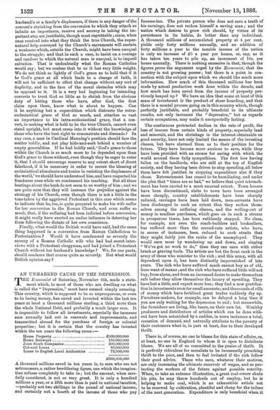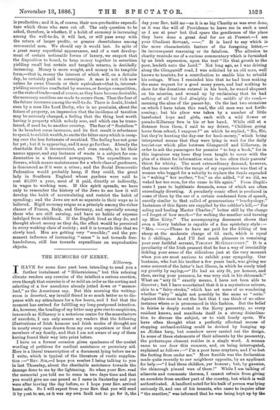AN UNMARKED CAUSE OF THE DEPRESSION.
THE Economist of Saturday, November 6th, made a state- ment which, to most of those who are dwelling on what is called the "Depression," must have seemed simply amazing. This country, which is supposed to be so unprosperous, or even to be losing money, has saved and invested within the last ten
years at least a thousand millions sterling, a third more than
the whole National Debt, and probably a mach larger sum. It is impossible to follow all investments, especially the immense sum annually laid out in renewals and improvements, and transmitted abroad for the purchase of foreign or colonial properties ; but it is certain that the country has invested within the ten years the following sums.—
House Property 2400,000,064/ Home Railways .. ....... ........ 186,000,000 Joint Stock Companies 200,000,000 Colonial Loans 80,000,000 Loans to English Local Authorities 72,000,000 2938,000,000
A thousand millions saved in ten years is, to men who are not astronomers, a rather bewildering figure, one which the imagina- tion refuses completely to take in ; but the amount, when care- fully considered, is not so very great. It is only a hundred millions a year, or a fifth more than is paid in national taxation, —probably not two shillings in the pound of national income, and certainly not a fourth of the income of those who pay Income-tax. The private person who does not save a tenth of his earnings, does not reckon himself a saving man ; and the nation which desires to grow rich should, by virtue of its persistence in its habits, do better than any individual. A thousand millions of accumulated property at 4 per cent. yields only forty millions annually, and an addition of forty millions a year to the taxable income of the nation is only an increase of 25 a year per house, or, say, as it has taken ten years to pile up, an increment of 10s. per house annually. There is nothing excessive in that, though the figures prove the argument urged by the Economist, that the country is not growing poorer; but there is a point in con- nection with the subject upon which we should like much more information. How much of this thousand millions has been made by actual productive work done within the decade, and how much has been saved from the income of property pre- viously heaped up 14 We have an idea that some at least of this mass of investment is the product of sheer hoarding, and that there is a mental process going on in this country which, though perfectly justifiable, and probably beneficial in its ultimate results, not only increases the "depression," but as regards certain occupations, may make it unexpectedly lasting.
The continuous protracted decline in the rate of profit, the loss of income from certain kinds of property, especially land and minerals, and the shrinkage in the interest obtainable on good security, have not only limited the means of the investing classes, but have alarmed them as to their position for the future. They have become more anxious to save, while they have been provided with an excuse for saving with which the world around them fully sympathises. The first loss having fallen on the landlords, who are still at the top of English society, and they having been driven to stop spending, all below them have felt justified in stopping expenditure also if they chose. Retrenchment has ceased to be humiliating, and under the plea that "times are so bad," we believe that quiet retrench- ment has been carried to a most unusual extent. Town houses have been discontinued, visits to town have been arranged more cheaply, country establishments have been sharply reduced, carriages have been laid down, men-servants have been discharged to such an extent that they reckon them- selves among the suffering classes, and the welling-out of money in needless purchases, which goes on in such a stream in prosperous times, has been ruthlessly stopped. No class, for example, not even the coach-builders and booksellers, has suffered more than the second-rate artists, who have, in scores of instances, been reduced to such straits that they might fairly join the ranks of the unemployed. They would earn more by wandering up and down, and singing "We've got no work to do," than they can earn with either brush or graving tools. The artists are but the front rank in the army of those who minister to the rich ; and this army, with all dependent upon it, has been distinctly impoverished of late years. The rich who have suffered much cannot buy as of old, from want of means ; and the rich who have suffered little will not buy, from alarm, and from an increased desire to make themselves safe before they allow themselves the luxury of spending. They have lost a little, and expect more loss ; they find a new gratifica- tion in investments even for small amounts; and thousands of rills of money which have fertilised great trades suddenly dry up. Furniture-makers, for example, can be delayed a long time if you are only waiting for the depression to end ; but meanwhile, the furnishers are living, like bears, on their own fat. Wealthy producers and distributors of articles which can be done with- out have been astonished by a sudden, in some instances a total, cessation of demand, and naturally attribute to the poverty of their customers what is, in part at least, due to their developed thrift.
There is, of course, no one to blame for this state of affairs, or, at least, no one in England to whom it is open to distribute blame. We are all of us committed to the praise of thrift. It is perfectly ridiculous for moralists to be incessantly preaching thrift to the poor, and then to feel irritated if the rich follow their good advice. Those who save, whatever their motives, are only increasing the ultimate reservoir of wages, and so pro- tecting the workers of the future against possible scarcity. When, to take an extreme illustration, a great coal-owner shuts his pits, he may throw hundreds out of employ, but he is helping to make coal, which is an exhaustible article not to be renewed by cultivation, plentiful and cheap for the toilers of the next generation. Expenditure is only beneficial when it
is productive ; and it is, of course, their non-productive expendi- ture which those who Rave cut off. The only question to be asked, therefore, is whether, if a habit of economy is increasing among the well-to-do, it will last, or will pass away with the return of larger profits, or greater cheerfulness among commercial men. We should say it would last. In spite of a great many superficial appearances, and of a vast develop- ment of certain noticeable forme of luxury, we suspect that the disposition to hoard, to heap money together in securities yielding small but certain and tangible returns, is decidedly increasing. Money is more sought, and money in its tangible form,—that is, money the interest of which will, on a definite day, be certainly paid in sovereigns. A man is not rich now unless he owns Consols or their equivalent—that is, interest- yielding securities unaffected by seasons, or foreign competition, or the state of trade—and of course, as they have become desirable, the necessary sacrifices are made to secure them. Then the fear of the future increases among the well-to-do. There is doubt, hinted even by a man like Lord Derby, who is no pessimist, about the future of property, an impression that the incidence of taxation may be seriously changed, a feeling that the thing best worth having is property which nobody sees, and which can be trans- ferred, if need be, to another country. The fear of" Socialism" in its broadest sense increases, and its first result is reluctance to spend, to exhibit wealth, to excite the bitter envy which is creep- ing over the less fortunate of mankind. The feeling has not gone far yet ; but it is appearing, audit may go further. Already the charitable find it inconvenient, and even unsafe, to let their names appear, and any instance of waste is a subject for con- demnation in a thousand newspapers. The expenditure on flowers, which means maintenance for a whole class of gardeners, is denounced as if it were a crime ; and the Social Democratic Federation would probably hang, if they could, the great lady in Southern England whose gardens were said to cost 25,000 a year, most of it paid, directly or indirectly, in wages to working men. If this spirit spreads, we have only to remember the history of the Jews to see how it will develop the habit of accumulating and restrict the habit of spending ; and the Jews are not so separate in their ways as is believed. Rigid economy reigns as a principle among the richer classes of France, Italy, and Germany, and especially among those who are still earning, and have no habits of expense indulged from childhood. If the English lived as they do, and thought about money as they do, the effect would be perceived in every working class of society ; and it is towards this that we slowly tend. Men are getting very " sensible ;" and the per- manent influence of increasing " sense " is not towards free. handedness, still less towards expenditure on unproductive objects.



































 Previous page
Previous page